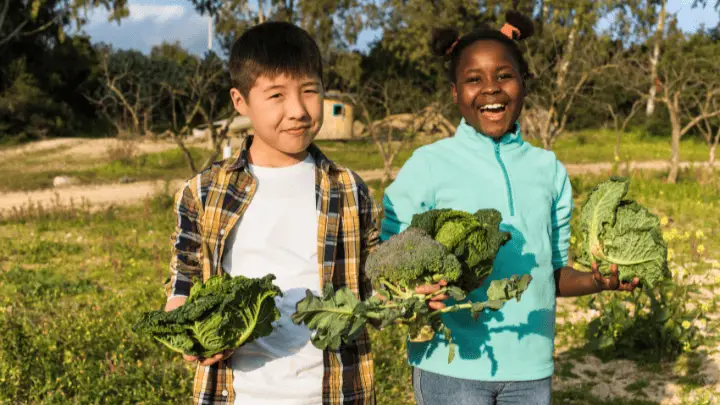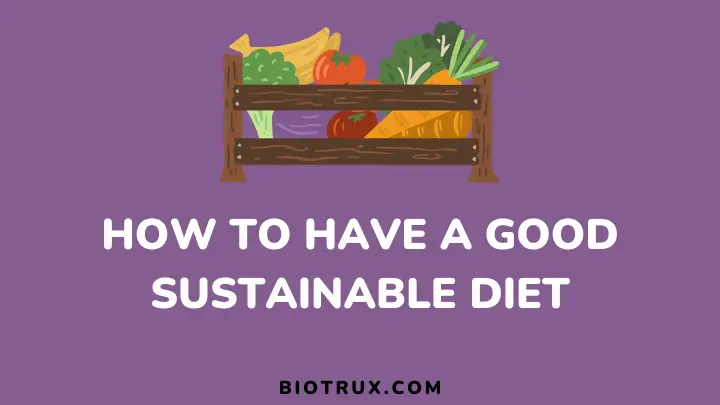What is a good sustainable diet, and why should you care? A sustainable diet meets your nutritional needs while minimizing the environmental impact of your food choices. It also supports the health and well-being of the people who produce and distribute your food.
A sustainable diet can help you reduce your carbon footprint, save water, protect biodiversity, and prevent food waste. Sounds good, right? But how do you actually have a good, sustainable diet?
In this article, I will share some tips and practical examples of how to eat well for yourself and the planet. I will cover tips such as choosing seasonal and local foods, reducing animal products, planning your meals, and cooking with leftovers.
By the end of this article, you will have a better understanding of how to have a good, sustainable diet that is delicious, nutritious, and eco-friendly.
Let’s get started.
1. Educate Yourself and Be Ready for a Change
Below, you’ll find a couple of tips to have a sustainable diet. In fact, there are more tips on the internet. However, I have a deep conviction that for you to have a good, sustainable diet, it all starts with what you know and what you are willing to change.
A lot of people think that they can just follow some tips and tricks and magically transform their eating habits, but that’s not how it works. You need to understand why you eat what you eat, how it affects your health and the environment, and what you can do to make better choices.
You need to be willing to try new foods, experiment with different recipes, and adjust your lifestyle accordingly. There are many resources available online and offline to help you learn more about nutrition, sustainability, and food culture.
But ultimately, it all starts with a mindful mindset. A mindset that is curious, open, and flexible. A mindset that is not afraid of change but embraces it as an opportunity to grow and improve sustainably.
2. Grow Your Own Food
Growing your own food is a crucial tip if you want to have a good, sustainable diet. By working towards a sustainable garden, you can eat more fresh fruits and vegetables that are rich in nutrients and free of harmful chemicals.
You can also save money, reduce waste, and lower your carbon footprint by avoiding buying food that is shipped from far away. Gardening can also improve your physical and mental health by giving you exercise, time in nature, and stress relief.
Growing your own food can be a rewarding and enjoyable way to feed yourself and your family better.
3. Choose Fruits and Vegetables That Are in Season
In-season produce refers to fruits and vegetables that are currently being harvested and are at their peak freshness and flavor.
These are the foods that are naturally available during a particular time of the year, depending on the climate and location. Choosing in-season produce means that you are selecting fruits and vegetables that are grown locally and are not shipped from far away.
Produce grown in season not only tastes great but also has significant environmental benefits. Transporting out-of-season items involves long distances, contributing to carbon emissions.
For instance, relishing juicy strawberries in summer instead of importing them in winter not only enhances taste but also aligns with eco-conscious choices. By aligning our diets with the natural rhythm, we not only enjoy the freshest flavors but also contribute to a healthier planet.
4. Choose Whole Grains
One of the most important tips for having a good, sustainable diet is to choose whole grains over refined grains. Whole grains are grains that have not been processed to remove their bran and germ, which contain fiber, nutrients, and plant compounds that can benefit your health.
Eating whole grains can lower your risk of heart disease, stroke, obesity, and type 2 diabetes. For example, one study found that people who ate three servings of whole grains per day had a 25% lower risk of heart disease and a 14% lower risk of stroke than those who ate less than one serving per day.
Some examples of whole grains are oats, barley, quinoa, brown rice, buckwheat, and rye. You can include them in your diet by having oatmeal for breakfast, adding barley or quinoa to soups and salads, and using brown rice instead of white rice.
You can also make pancakes or muffins with buckwheat flour or enjoy rye bread or crackers. By choosing whole grains, you can enjoy a delicious and nutritious diet that is good for you and the planet.
5. Avoid Unnecessary Packaging
If you want to have a good, sustainable diet, one of the crucial tips is to avoid unnecessary packaging. Packaging, especially when made of non-recyclable materials, can have a huge impact on the environment.
It wastes energy and resources and contributes to pollution and landfills. You can reduce the number of packaged products you buy by choosing unpackaged, bulk, or minimally packaged food products.
For example, you can buy fruits and vegetables that are not wrapped in plastic or meat from a butcher who does not use polystyrene trays. By avoiding unnecessary packaging, you can help save the planet and eat healthier at the same time.
6. Get Creative with Leftovers
One of the best tips for having a good, sustainable diet is to get creative with leftovers. Instead of throwing away food that you don’t eat, you can use it to make new dishes that are delicious and nutritious.
For example, you can turn leftover chicken into chicken salad or leftover bread into bread pudding. You can explore Instagram reels and YouTube for more ideas. By doing this, you not only save money and reduce food waste but also increase the variety and balance of your meals.
According to a study by the Food and Agriculture Organization, food waste accounts for about 8% of global greenhouse gas emissions. Therefore, getting creative with leftovers is not only good for your health, but also for the environment.
7. Hydrate Responsibly and Conserve Water
Hydrating responsibly and conserving water are two essential tips if you want to have a good, sustainable diet. Drinking enough water each day is important for your health, as it regulates your body temperature and lubricates your joints.
Drinking water also prevents infections, delivers nutrients to your cells, and improves your sleep, cognition, and mood. However, water is also a precious resource that should not be wasted.
You can conserve water by keeping the tap closed when not in use and checking for leaks in your pipes. Additionally, you can use rainwater for gardening or washing and recycle grey water for flushing toilets or watering plants.
8. Support Local and Sustainable Brands
One of the most important tips for having a good, sustainable diet is to support local and sustainable brands. Most local and sustainable brands use organic, seasonal, and fair-trade ingredients that are healthier for the environment and have a higher nutritional value.
By supporting local and sustainable brands, you are also supporting the local economy, the farmers and the workers who produce your food. You can find local and sustainable brands in farmers’ markets, co-ops, online platforms or even in some supermarkets.
9. Cut Down on Processed Foods
Processed foods are foods that have been altered from their natural state, such as ready meals, baked goods, and processed meats. These foods often contain high amounts of sugar, salt, fat, and additives that can harm your health.
Studies have linked processed foods to obesity, diabetes, heart disease, and cancer. To avoid these risks, you should limit your intake of processed foods and choose more whole foods, such as fruits, vegetables, grains, nuts, and lean meats.
These foods are rich in nutrients and fiber that can support your health and well-being. By cutting down on processed foods, you can improve your health and the environment.
10. Set Realistic Goals and Meal Plans
One of the most important tips for having a good, sustainable diet is to set realistic goals and meal plans. This means that you should not try to drastically change your eating habits overnight or follow a diet that is too restrictive or unrealistic for your lifestyle.
Instead, you should aim for gradual and consistent changes that you can stick to in the long term. For example, you could start by adding more fruits and vegetables to your meals, reducing your intake of processed foods and sugars, and drinking more water.
You could also use a calorie tracker app or a food diary to monitor your progress and adjust your plan accordingly. By setting realistic goals and meal plans, you will be more likely to achieve and maintain a good, sustainable diet that improves your health and well-being.

FAQs
How do you start transitioning to a sustainable diet?
Embarking on a sustainable diet journey is about gradual changes. Begin by incorporating more plant-based foods, buying local, and being mindful of food waste.
Are there specific foods that are a must in a sustainable diet?
Yes. Foods like legumes, leafy greens, and whole grains are staples. Embrace a variety of fruits and vegetables to ensure a diverse and nutrient-rich diet.
Can a sustainable diet save you money?
Yes. Buying local, in-season produce is often more budget-friendly. Additionally, reducing meat consumption can positively impact your grocery bill.
Is it possible to maintain a sustainable diet while dining out?
Yes, opt for restaurants with a focus on local and organic ingredients. Choose plant-based options or lean, sustainably sourced meats.
How can you reduce food waste in your sustainable diet?
Plan your meals, store food properly, and get creative with leftovers. Composting is also an excellent way to minimize food waste.
Can a sustainable diet benefit the environment?
Yes. By choosing local, seasonal, and sustainably sourced foods, you contribute to reducing your carbon footprint and supporting eco-friendly practices.
Final Thoughts
You’ve just learned some tips on how to have a good, sustainable diet that benefits your health and the planet. Now, it’s time to put them into practice and enjoy the results. Remember, a good, sustainable diet is not about deprivation or restriction but about balance and variety.
It’s about choosing foods that are nutritious, delicious, and environmentally friendly. It’s about listening to your body and your preferences and finding what works best for you. A good, sustainable diet is not only good for you, but also for the people and animals who share this world with you.
So go ahead and try some new recipes, experiment with different cuisines, and discover the joy of eating well. You’ll be surprised by how easy and satisfying it can be to have a good, sustainable diet.
You can also learn more about generating sustainable income.
Thanks for reading.

